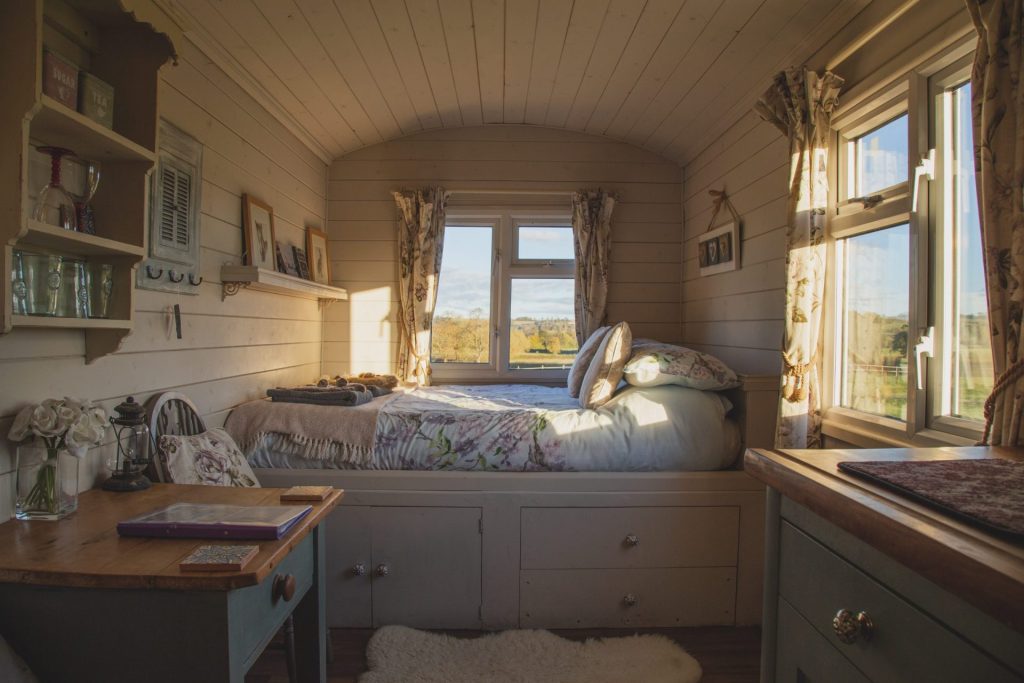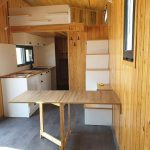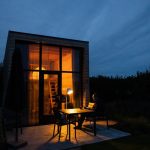Tiny house living has some obvious pros and cons: saving money, fewer amenities, mobility, minimal storage, less space, more bureaucracy. But what is less obvious is that the trade-offs are as varied and variable as the tiny house community itself, each unique to the individual resident. What is a professional today may be a crook tomorrow. In just six months of living in a 250 square foot place on wheels, we quickly discovered our 12 major pros and cons, some expected, some unexpected, and all open to change in the next six months.
Imagine walking through the door of your home and being able to see your entire living space with a single glance. In front of you is the bedroom, kitchenette, bathroom and a small living room. Each item has a specific purpose and place, and you don’t own anything you don’t use, need or want. And it takes less than an hour to clean your home from top to bottom.
Spending time in your home means living closely with your spouse or partner. Instead of watching TV or reading a book in separate rooms, you do these activities together. Your energy bills are minimal because there is less space for heating and cooling, and you spend less on food because you don’t have a big fridge or pantry where it can disappear. As a result, you save a significant amount each month.
When you look at it from this perspective, living in a house of less than 500 square metres sounds simple, frugal and blissfully stress-free. Living in a tiny house has compelling benefits, but it also has its challenges.
Tiny House Benefits
There are many good reasons why some people choose to live in a home smaller than 250 to 500 square feet. These homes consist of only a few rooms – usually a kitchen, living area and bedroom. Other tiny homes are completely open, like a studio.
- Less Clutter. When you have a tiny home, filling it with “stuff” is not an option, at least not if you really want space to move around. When your home is small, you have to make some hard choices about what to keep and what to get rid of. This means you can’t go out and buy frivolous things when you’re bored or demoralised.
- Less Time Spent Cleaning. Cleaning two or three small rooms takes much less time than cleaning seven or eight large rooms. It’s also faster to clean because you don’t have ornaments and clutter to pick up or clean.
- More Savings. Living in a tiny house saves money in many different ways. You don’t spend as much on heating, cooling, property taxes, or home maintenance. You save money on food (because you have a smaller pantry and refrigerator) and you almost completely eliminate idle shopping.
- Higher Quality of Life. Many tiny house owners report that their quality of life and overall happiness improved when they shed their “stuff” and started living small. There are many reasons for this: They feel less overwhelmed by the junk they used to own or a large mortgage, and they spend less time and money cleaning and maintaining their home, which allows more time and money for leisure activities. .
- Lower Carbon Footprint. Finally, all of these benefits provide a huge benefit for the environment. Tiny houses are green homes because they use less energy, produce less waste and consume fewer resources (in the form of products that are no longer purchased) than larger homes.
Tiny House Disadvantages
Many people have bedrooms and even closets bigger than these small homes. And the thought of cramming all your worldly possessions into such a small space can be daunting.
Here are a few disadvantages of tiny house living:
- Organisation is a Must. You should take advantage of every organisation idea for small spaces, otherwise your tiny home will look like a cluttered closet. You won’t want to spend time there.
- You Can’t Have Everything. It can be hard to decide which items to buy for this tiny space, especially if you have plenty or extended family heirlooms.
- Entertaining is a Challenge. Entertaining in a tiny home has its limits. You can go out during the warmer months, but winter can force you to limit your guest list.
Despite the challenges, the idea of living in a tiny house has been gaining popularity in recent years, especially since the recession began.
Tips for Living in Tiny House Homes
There are several ways to maximise the space of a small home. These tips can also help you gain control over the space and clutter of a larger home.
- Being able to cook outside or enjoy an afternoon thunderstorm on the front porch will make living in such a small space less of a hassle. A large deck or front porch can make the home seem larger, especially if you like to entertain.
- Clutter. Limiting the possessions you own is an important element of living successfully in a small home.
- Maximise Space. Maximise storage by looking at areas that are often wasted. You can store clothes in boxes under the bed or choose a cot with several drawers underneath. Built-in benches for a kitchen or deck table can also double as storage space.
For many people, it is difficult to imagine living in a small house. But for some, the benefits far outweigh the inconvenience. Having more free time, less worry, clutter and more money to spend often equates to a higher quality of life. Contact us.










